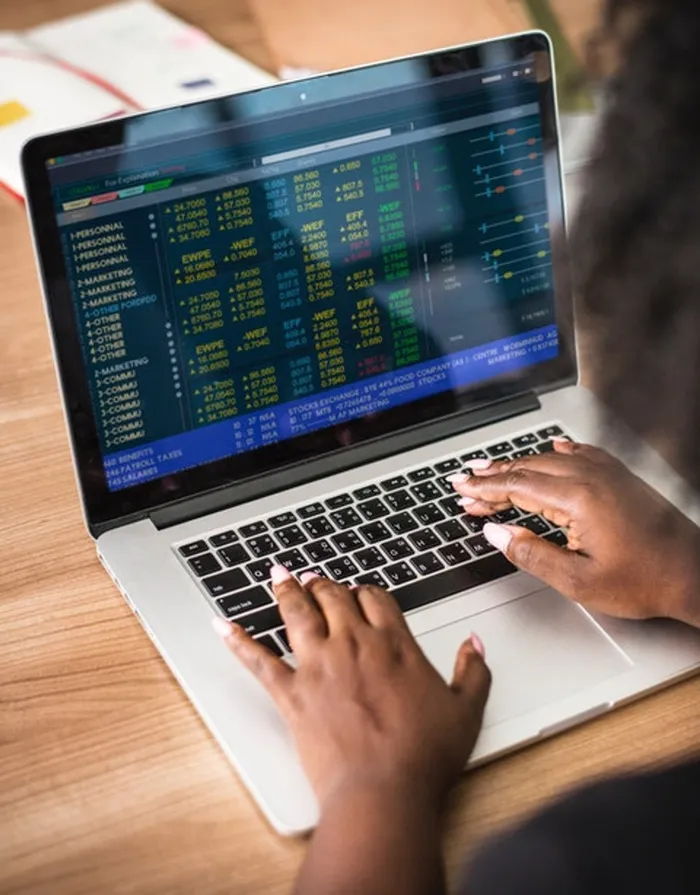Investors need to maintain discipline to counteract fear and greed

Making sound decisions as a trader in financial markets relies heavily on the availability and accessibility of data. Image via Nappy.co
By Kamogelo Mosime
Making sound decisions as a trader in financial markets relies heavily on the availability and accessibility of data. Historical trends, market performance data and metrics like liquidity, volatility and volume play an important role in informing decisions. There is, however, a psychological dimension to trading. The ability to make quick decisions, exercise discipline and regulate emotions are some of the factors that contribute to whether traders have the staying power they need to achieve long-term success.
The last decade has seen the proliferation of online platforms which essentially cut out the middleman and opened the trade of financial instruments to the ordinary man on the street. This trend has propelled the emergence of a global community of retail traders, who have the opportunity to trade securities for their own personal gain. But while greater inclusivity and the democratisation of the investment world certainly have real, tangible benefits, there are also several hurdles to overcome.
One of these primary obstacles is that, unlike seasoned professionals who are skilled at overcoming psychological roadblocks like unconscious bias and impulsive decision-making, new and inexperienced traders are significantly more vulnerable to these emotional pitfalls.
Offsetting the effects of fear
Traders who are driven to succeed, need to master the art of facing fear. Unexpected market shocks and fluctuations that lead to sudden financial losses, can cause traders to make rash decisions and dampen their appetite for risk. Factors such as these are behind some of history’s greatest examples of investors hastening to sell their shares at a loss in order to remain liquid and sidestep the potential for financial devastation.
Conquering fear and learning how to work past it by ‘holding down the fort’ and standing by your resolutions is an invaluable skill. There are several practical ways to do this. Some traders use a trading plan to manage their emotional reactions. This plan outlines the trader’s main motivations for participating in the market, the goals they wish to achieve and in which time periods, their personal risk-reward ratio and limits on the capital they are willing to spend. By having a trading plan and sticking to it, regardless of which external factors come into play, you can avoid acting impulsively out of fear and maintain a sense of balance.
Keeping greed in check
Another common enemy of all traders is greed. When the going is good, knowing when to exit a transaction and be satisfied with the profits, is crucial. The feeling of greed is best identified by the urge to make just a little bit more profit even after meeting your goals. Here; as is the case with managing feelings of fear, sticking to a trading plan can ensure that greed does not undermine your good sense of judgement.
Another strategy to counteract greed is to keep a trading journal, which outlines all transactions that have been entered into, the results of those trades and very simply, which strategies are working and which are not. Keeping a trading journal will ensure that your emotions don’t ‘run away with you’ and that you don’t fall prey to the desire to stray from your risk management strategy when motivated by greed.
Knowing your limits
Another way on which traders can make sure that their sense of rationality is not overrun by their emotions is by setting stop-loss orders. These are limits that are set per trade to lock in a predetermined level of profit on an existing position. Not only does this allow traders to control their exposure to risk, it is also an effective way to make sure that you abide by your limits and stay on track to realising your long-term vision.
One of the most valuable realisations traders can have is that beyond micro- and macroeconomic factors and realities like market volatility; as humans, they are often their biggest risk. Finding ways to keep emotions under control and to avoid acting on them when the pressure mounts, is arguably one of the greatest assets that traders can have in their arsenal of tools.
Kamogelo Mosime is the Partnership Manager at Tickmill
** The views expressed do not necessarily reflect the views of Independent Media or IOL.
BUSINESS REPORT
Related Topics: